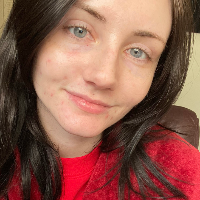Sunscreen 101: What It Does For Your Skin And Why You Should Use It
About 2 years ago, I became engrossed in Asian beauty, and learned about the importance of sunscreen. Something that really stood out to me was learning that even on an overcast day, up to 80% of the sun rays can still sneak out through the clouds. It's probably not something most people have thought about, but it makes sense. Clouds provide some protection, but since they're made up of mostly ice and water droplets, it's not a lot.
I talked to some of my peers about sunscreen and found that most of them didn't wear sunscreen every day or not at all. This didn't really surprise me. The typical sunscreen has an overpowering smell of piña colada, and is such a mess to put on, so I don't blame people for having an aversion to it.
These detested sunscreens are usually body sunscreens, they are loaded with fragrance and other chemicals that can irritate the skin on your face; where you have some of the most sensitive skin. If you feel skeptical because of your experiences with wearing sunscreen, read through to the end, and I'll share some of my sunscreen recommendations.
First, lets have a brief introduction into sunscreen.
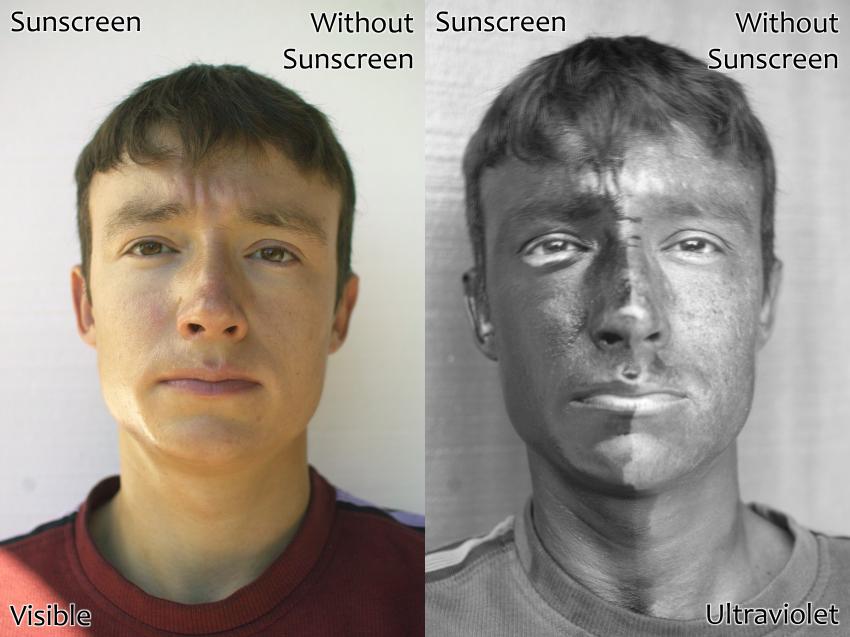
Types of sunscreen: pros and cons
Physical A.K.A. Mineral
- Pros: Best for acne-prone or sensitive skin, instant protection.
- Cons: Need to re-apply often, can wash off easily with sweat.
Chemical
- Pros: Suitable for most skin types, doesn't leave a white cast.
- Cons: You need to wait 15-20 minutes for it to take effect,
There's no right or wrong choice, you just have to find what works the best for your skin. In any case, you need to look for a broad-spectrum sunscreen with at least 30 SPF.
Can't I just use my makeup with SPF instead?
Dermatologists say no, you need to use an actual sunscreen alongside your makeup. You would need to apply a ton of the SPF makeup for it to work, and then re-apply every couple of hours. Having to smear on tons of makeup for sun protection doesn't sound like a good time. The bottom line is you won't be properly protected if you aren't wearing an actual sunscreen.
What's in sunscreen?
The active ingredients in sunscreens vary by type, but a few ingredients you will commonly find are: titanium dioxide, avobenzone, zinc oxide, oxybenzone, and octisalate. You may be already familiar with some of these ingredients; a study recently released found that the chemicals in sunscreen are absorbed into our skin. The results of the study didn't find any evidence that this absorption causes any damage, but consumers were worried regardless.
It's up to use to decide if you want to avoid certain ingredients. However, you cannot avoid every single common active ingredient and have an efficient sunscreen. The bottom line is sunscreen that does not have at least one of the common active ingredients will not work.
Now that we've finished sunscreen 101, we can talk about why wearing sunscreen is so important.
Protects against skin damage
Up to 90% of premature aging of the skin is caused by the sun. UV radiation attacks collagen, which causes skin to lose its elasticity and start wrinkling. Sun rays consist of two types of UV rays: UVA and UVB. UVB rays are what cause your sun burn, UVA rays penetrate deep into your skin and cause damage. Along with causing wrinkles, UVA rays can also create a rough texture on the skin and create an uneven pigmentation.
UV radiation can also cause lesions to develop on your skin called actinic keratoses. These growths are considered premalignant; meaning they are generally benign, but have a chance of becoming cancerous later on. They appear in the form of a scaly, red patch that can occupy virtually any space on your upper body.
Lowers your risk for skin cancer
Skin cancer occurs when cells start to multiply out of control. The most common cause of skin cancer is UV radiation. Skin cancer is the most common kind of cancer in the United States. Tanning culture is in part responsible for this, but so is an apathetic attitude towards sun damage. I advise skipping the tanning bed as much as possible and opting for a bronzer.
Risk Factors
- Pale skin
- Old age
- Smoker
- Weak immune system
- Numerous moles
I can recall a time that I came home from summer camp severely sunburned. I remember my mom being upset, and I didn't understand it; I thought everyone wanted to avoid sunburns just because of the pain. Parents tend to worry about things that are impossibilities, but worrying about your pale child getting skin cancer after is plausible.
This isn't to say that if you're pale you should always avoid the sun, but it's for the best if you do everything you can to avoid a sunburn; meaning you should wear sunscreen every day.
An article on skincancer.org states,
Having 5 or more sunburns doubles your risk for melanoma.
As promised, here are some of my favorite sunscreens as suggestions for anyone looking for face sunscreens that are great and don't break you out. Don't forget to add in a decent lip balm with SPF too!
Canmake Mermaid Skin UV Gel
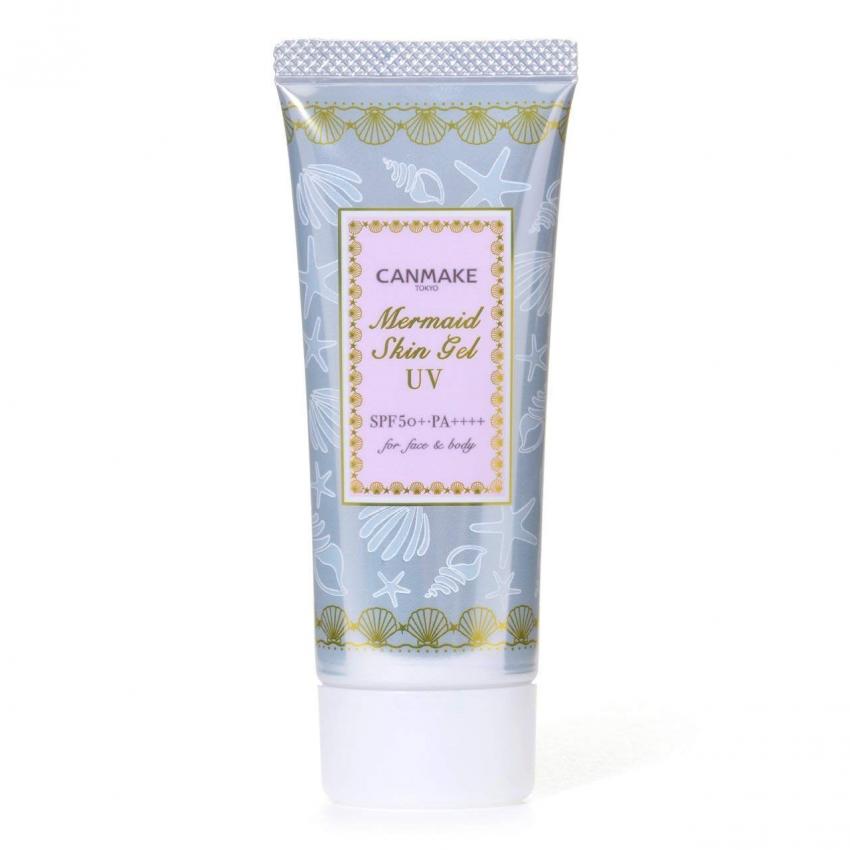
Buy here for $11.99
Sunscreen ingredients:
- Zinc Oxide: A white powder substance commonly found in sunscreens, but can also be found in products such as anti-dandruff shampoos and baby powder.
- Titanium Oxide: A fine, white powder used in sunscreens and also makeup.
- Octinoxate: Used commonly in sunscreens to filter UVB rays. It's also used in other products such as shampoo and lipstick.
- Bemotrizinol: A broad-spectrum sunscreen agent.
Skincare ingredient highlights:
- Morus Alba Root Extract: Also known as white mulberry extract, can soothe inflamed skin, correct skin tone, and protect the skin against environmental damage.
- Prunus Yedoensis Leaf Extract: This extract is also a superstar when it comes to calming irritated skin and is used for its anti-inflammatory properties.
- Jojoba Esters: Used commonly as an emollient, jojoba esters have occlusive properties that make them ideal in moisturizers.
- Arginine: This amino acid can also be found in many foods such as beans, nuts, and eggs. It's an antioxidant with soothing and hydrating properties.
COSRX Aloe Soothing Sun Cream
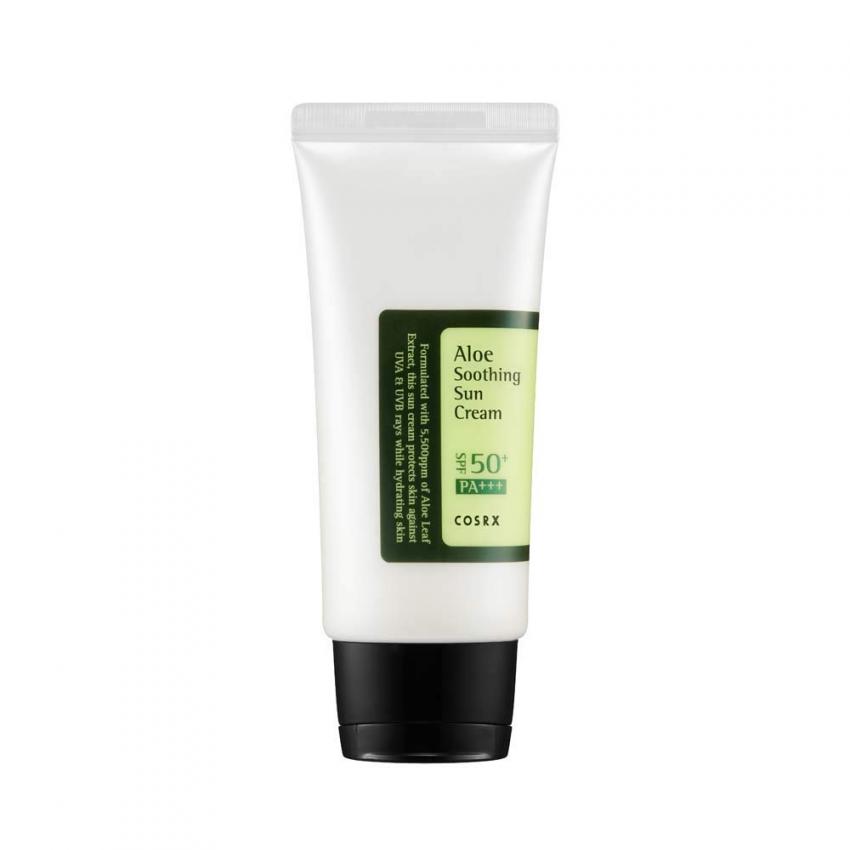
Buy here for $19
Sunscreen ingredients:
- Octinoxate
- Titanium Dioxide
- Bemotrizinol
- Ensulizole: A water-soluble sunscreen agent used to protect against UVB rays.
- Amiloxate: An oil-soluble sunscreen agent used to protect against UVB rays.
Skincare ingredient highlights:
- Aloe Arborescens Leaf Extract: Aloe extract is a common ingredient in cosmetics for it's soothing and hydrating effects on the skin.
- Glycerin: This ingredient that has been used in cosmetics for more than 50 years. Glycerin is a moisturizing compound that occurs naturally in the human body.
ETUDE HOUSE Sunprise Mild Airy Finish Sun Milk
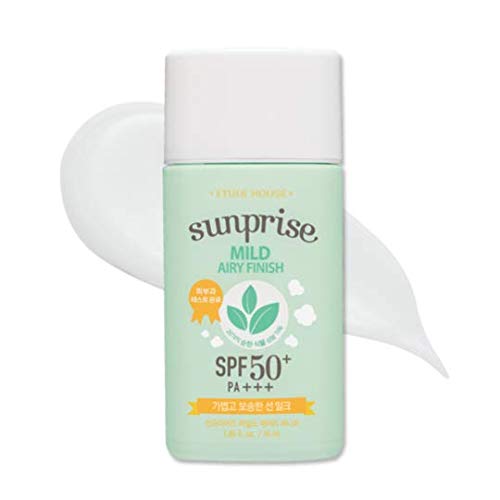
Buy here for $13
Sunscreen ingredients:
- Zinc Oxide
- Titanium Oxide
Skincare ingredient highlights:
- Portulaca Oleracea Extract: A powerful antioxidant with anti-inflammatory properties that can even heal infections.
- Centella Asiatica Extract: This extract is also an antioxidant with wound-healing properties, but it's also a great moisturizer.
Ultimately, the sun can be harmful, but it's also needed. Without the sun, the earth would freeze over, and we would die. But the damage that the sun can do to skin is not debatable, and taking precaution is a smart thing to do. Luckily, there are many great sunscreens out there to choose from!
